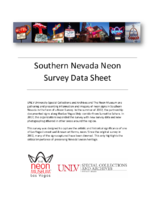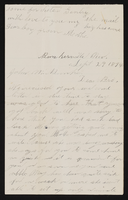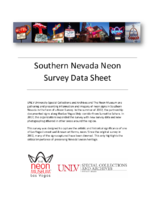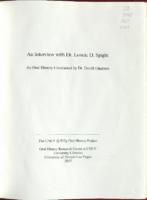Search the Special Collections and Archives Portal
Search Results

Kings Row Trailer Park Neon Survey document, September 14, 2017
Date
Archival Collection
Description
Site address: 3660 Boulder Hwy
Sign owner: Kings Row Trlr Pk Inc
Sign details: This property is still functioning as a mobile home park along Boulder Highway. They are one of the largest RV parks in Southern Nevada and within a close distance to downtown and Boulder Station Casino. They advertise that they have some of the best deals in town as well as about 200 spaces available. They have been operating in Las Vegas for more than 60 years.
Sign condition: 5 - in great condition, well maintained
Sign form: Roadside pole with a message center and directional elements
Sign-specific description: This sign is made up of many different small cabinets. The top is a painted crown that is plastic and backlit. This sits on top of a red minimal arrow sign that points to the direction of the trailer park. This sign has yellow incandescent light bulbs lining the edge with "Kings Row" painted in white paint on the top of the sign, "Trailer Park" painted in bold yellow text in the center, and the text is outlined with neon tubes. The cabinet under this is a long, red trapezoid with "OVERNITES" painted on it in bold white text that is also outlined with neon tubes. Under this is what appears to be an iron flourish on top of another plastic backlit sign. This sign as "RV SPACES" painted on it in bold red text over yellow paint, "INDOOR HOMES TRAILERS CAMPING" in bold red text against a white background, and "MOBILE HOME SPACES POOL REC HALL" in bold red text against a yellow background. Under this is another iron flourish. Following that sign is a plastic backlit reader board. Under that is a plastic backlit sign with "CAMPERS" in white text and underlined against a red background. Finally, there is another plastic sign in the shape of an arrow with "Kings Row" in a light blue script, "ENTRANCE " in red, and "TRAILER PARK" in black inscribed on it.
Sign - type of display: Neon, incandescent, backlit
Sign - media: Steel and Plastic
Sign - non-neon treatments: Paint
Sign environment: This property sits along Boulder High way and near many other RV rental businesses. It is also down the street from Boulder Station Hotel & Casino.
Sign - date of installation: Possibly c. 1962
Sign - date of redesign/move: Current sign not the original, which was a long rectangular shape cabinet
Sign - thematic influences: This sign is very unique to the RV park. To emphasize the "Kings Row" theme, the crown perched on the top of the sign is designed to help with this. Much of this sign is used to tell motorists and pedestrians what the property has.
Sign - artistic significance: This sign is elaborate. There are many different elements to this sign overall. This sign is that there is a crown to signify the royal theme of this property, possibly as a way to differentiate from other RV park signs around town.
Survey - research locations: Kings Row website, assessor's website
Surveyor: Lauren Vaccaro
Survey - date completed: 2017-09-14
Sign keywords: Neon; Incandescent; Backlit; Steel; Plastic; Paint; Pole sign; Roadside; Directional; Reader board
Text

Letter from Francis M. Bunker and John M. Bunker's Mother, Bunkerville, Nevada to John M. Bunker
Date
Archival Collection
Description
From the Syphus-Bunker Papers (MS-00169). The folder contains an original handwritten letter, a typed transcription of the same letter, and a copy of original letter attached.
Text

James Dean Leavitt oral history interviews: transcript
Date
Archival Collection
Description
Oral history interviews with James Dean Leavitt conducted by Claytee D. White on September 27 and October 4, 2022 for the Boyer Early Las Vegas Oral History Project. In this interview, Leavitt recalls his role in establishing a medical school at the University of Nevada, Las Vegas (UNLV), now known as Kirk Kerkorian School of Medicine. Leavitt was elected to the Board of Regents in 2004 while Jim Rogers was interim Chancellor of the Nevada System of Higher Education (NSHE), and he suggested the creation of an ad hoc committee Health Science Center Committee. In 2009, Leavitt became Chairman of the Board of Regents, Dan Klaich became Chancellor, and in the following year, Dr. Mark Doubrava joined the board. In May 2014, the planning dean was hired, Dr. Barbara Atkinson, and the UNLV School of Medicine was officially established on August 22, 2014.
Text

Bunkhouse Saloon Neon Survey document, August 23, 2017
Date
Archival Collection
Description
Site address: 124 S 11th St
Sign owner: 11th Street Tavern LLC and Jillian is the manager (no last name found)
Sign details: This location opened in 1953, but has recently reopened under new ownership. This location is known for their concert venue as well as their southern style bar food.
Sign condition: 3-4- some fading in the plastic so it does not show as clear as an image as it could.
Sign form: Pylon
Sign-specific description: This sign has a black steel base with a sign box on top. This sign box is steel but has wood renderings on the sides of it. The sign box contains a back lit plastic sign that is red with yellow lettering that states "The Bunkhouse Saloon" in a swirly western font. Below this is a reader board.
Sign - type of display: Backlit plastic sign and reader board
Sign - media: Steel, wood and plastic
Sign - non-neon treatments: Plastic backlit sign and readerboard
Sign environment: This location is downtown on East Fremont across the street from PublicUs and a food market.
Sign - thematic influences: Their saloon theme is portrayed in the font on their sign. This theme could also pay homage to the early Las Vegas and Old West theme with the saloon idea.
Survey - research locations: Asessor's Page, Bunkhouse website http://www.bunkhousedowntown.com/about/ and google images.
Survey - research notes: Tried to contact manager for information on sign but no response.
Surveyor: Wyatt Currie-Diamond
Survey - date completed: 2017-08-23
Sign keywords: Pylon; Plastic; Backlit; Steel; Reader board
Text
Steve Sisolak (Nevada Governor) oral history interview conducted by Magdalena Martinez: transcript
Date
Archival Collection
Description
From the Lincy Institute "Perspectives from the COVID-19 Pandemic" Oral History Project (MS-01178) -- Elected official interviews file.
Text

Transcript of interview with Dr. Lonnie D. Spight by Dr. David Emerson, May 8, 2007
Date
Archival Collection
Description
Text
Stocker Family Papers
Identifier
Abstract
The Stocker Family Papers (1860-1982) document the family’s personal, political, and business interests including Mayme Stocker’s 1931 Nevada gaming license and Harold Stocker’s involvement in the Nevada Republican party. The collection contains family correspondence, political documents and planning materials, and business records related to the family’s gaming and real estate interests.
Archival Collection
Ferron and Bracken Photograph Collection
Identifier
Abstract
The Ferron and Bracken Photograph Collection depicts Southern and Central Nevada and other western states from 1890 to 1961. The photographs primarily depict the development and growth of early Las Vegas, Nevada; mines and mining operations in Southern and Central Nevada; towns and mines in Nevada; and the Hoover (Boulder) Dam and the Colorado River.
Archival Collection

Transcript of interview with Robert C. Maxson by Dr. David Emerson, May 15, 2007
Date
Archival Collection
Description
Text

Photographs of Roadhouse Casino sign, Las Vegas (Nev.), March 14, 2017
Date
Archival Collection
Description
Site address: 2100 N Boulder Hwy
Sign owner: Robert McMackin
Sign details: Roadhouse approved for gaming 1988, Robert McMackin bought the Roadhouse 1992, but it closed 2002. They planned to refurbish and reopen by 2010 but has been in legal trouble and has not reopened.
Sign condition: 2- reader board portion/plastic back lit portion is gone and paint has faded drastically
Sign form: Pylon
Sign-specific description: Big Letters on top "Roadhouse" below Is a Huge Letter "R". Still up but in horrible condition. Reader board is a frame and appears to be scrapped. No upkeep has been made to the sign. There is an array of colors behind the 'R' such as purple, white, yellow and green in a parallel plume shape.
Sign - type of display: Neon
Sign - media: Steel
Sign - non-neon treatments: There must have been plastic on this sign since there is a sign box that would contain it.
Sign environment: This location is on Boulder Hwy. near Sunset Road.
Sign - thematic influences: The letter R in the middle of the sign is remnant of the 1980's car/video game font.
Survey - research locations: Las Vegas Sun Article synopsis https://vegasinc.lasvegassun.com/business/legal/2012/mar/26/city-henderson-reverses-course-roadhouse-casino-li/ Review Journal article https://www.reviewjournal.com/business/casinos-gaming/station-casinos-henderson-settle-roadhouse-dispute/
Survey - research notes: The articles were helpful with finding information on this property since other avenues did not have any information on it.
Surveyor: Wyatt Currie-Diamond
Survey - date completed: 2017-09-01
Sign keywords: Pylon; Neon; Steel; Plastic; Incandescent; Backlit; Back to back
Mixed Content
